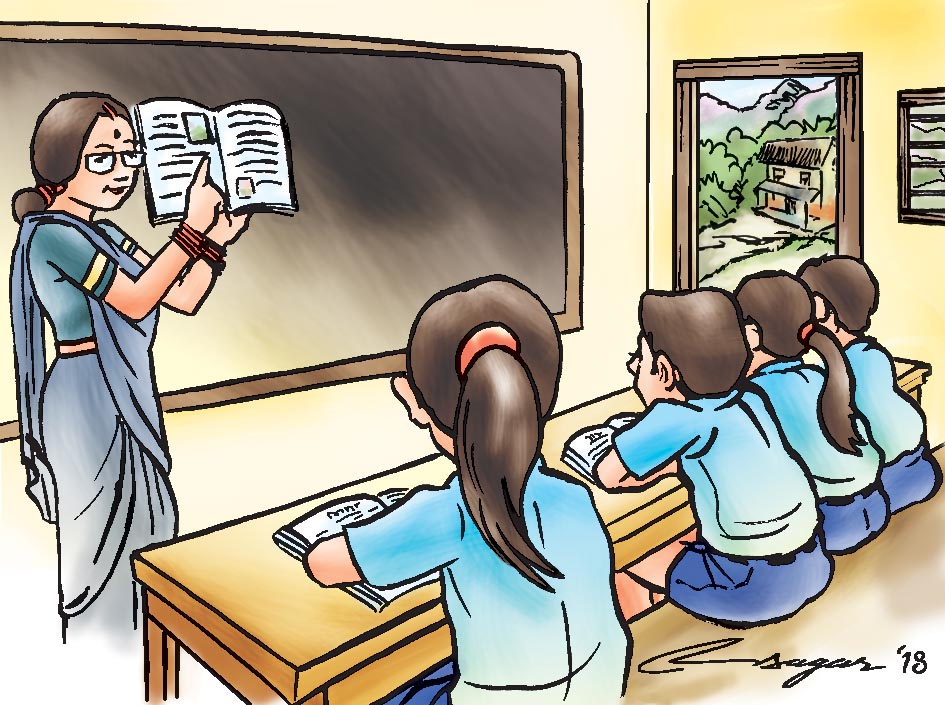Education in federal Nepal: What are challenges ahead?
Education in federal Nepal: What are challenges ahead?
Published: 10:10 am Aug 16, 2018

What we need is a strong willpower on the part of the governments and political actors to transform our education system. Only transferring the responsibility will be old wine in a new bottle, which will fail to effect substantial changes Education plays an important role in shaping, moulding, sharpening and directing an individual, the society and the nation towards achieving the desired goals. It is also regarded as the passport to the future. A good education gives cognitive tools to students to solve real-life problems. It is a key driver of economic success and social mobility. Therefore, management of quality education must be the highest priority of the country. It is not easy to make great strides in the present education system. The local governments are likely to face many challenges for immediate positive results. Since it is the new responsibility, smooth operations in themes like curriculum designing; managing physical infrastructure, teaching and non-teaching staff; arranging sufficient financial resources; and making education apolitical are major challenges in federal Nepal. It is also difficult to bring the quality of public schools in line with private schools. Lack of dutiful qualified subject teachers and their absenteeism; poor teaching practices (rote-learning, teacher-centred, exam-oriented, donor-driven among others); delayed or non-availability of text-books; lack of adequate financial support; poor and insufficient physical facilities; lack of basic requirements (pure drinking water, hygienic school environment, separate toilets for boys and girls), problem of roads and bridges, difficult weather and geographical conditions, poor socio-economic conditions, high drop-out rate; negative influence of culture; donors’ dominance and unnecessary influence of foreign programmes and institutional competition; and lack of technological support and quality teaching-learning practices are some long-standing problems in Nepal’s education sector. The quality of many public schools compared to private schools is very poor. The situation is worse in most of the schools in the rural and Terai areas. So strengthening public schools and managing private schools are also major challenges. The constitution for the first time has placed education as one of the main responsibilities of the provincial governments regarding it as the central pillar of newly formed provinces. It has also guaranteed education as the fundamental right of every citizen, which includes right to access to education and right to free education up to the secondary level. Now onwards, the responsibility to operate and manage secondary education (up to Grade XII) falls on local governments. The local governments must first gradually address the aforementioned challenges. The provinces have full authority to design curriculum, develop evaluation schemes, manage teachers and staff and physical facilities and adapt operational policies. Each province is now a policy maker, an advocate to ensure quality education and works as a liaison between educators and the public and the politicians. The curriculum up to Grade VIII should be designed by the local governments, based on local needs and for Grades IX to XII by the federal government, giving foundations for learning basic skills for livelihoods and further studies. Now the federal government is expected to maintain the decentralised behaviours, while bringing decision-making process more close to the people, largely due to the multilingual, multicultural, multi-ethnic backgrounds, along with different socio-economic geographical and demographical differences. The problem of access, equity and quality needs to be improved by maintaining cohesion and a set of shared values. Some practices like exams at terminating points (in Grades VIII, X, XII) – in Grade VIII by local governments, in Grade X by provincial governments and in Grade XII by the federal government – should be introduced. The central government must develop a broad-based policy framework in the fields of curricula, exams and management of teaching and administrative staff. Each school is in need of qualified subject teachers. Political biases, nepotism and favouritism must have no place in the education sector. And all the provinces should follow them by considering socio-economic and cultural factors (language, resources, geography, history, content of text-books, teaching materials, medium of teaching, selection of language and physical facilities). In our multilingual and multi-ethnic societies, it is wise to lay well-balanced emphasis on local, national and international languages to avoid alienation and national fragility. Multilingualism must be regarded as a way of life. Rote-learning, teacher-centered, exam-oriented, donor-driven systems are killing our students’ way of thinking, creativity, individuality, and we are becoming intellectually abusive. So we have to teach our students various generic and transferable skills to relate education to their lives. It must empower students to become analytical, critical, creative thinkers and problem solvers. What we need is a strong willpower on the part of the governments and political actors to transform our education system. Only transferring the responsibility will be tantamount to putting old wine in a new bottle, which will fail to effect substantial changes. The government must take education as the key to a stronger economic future of the nation. Gnawali is the founder principal of Universal College
